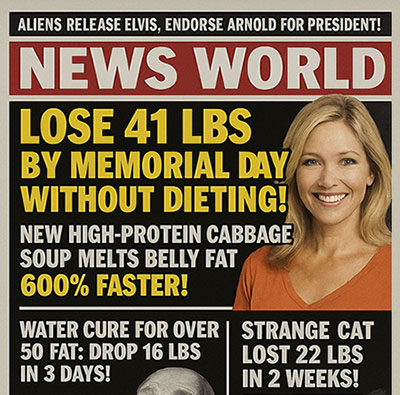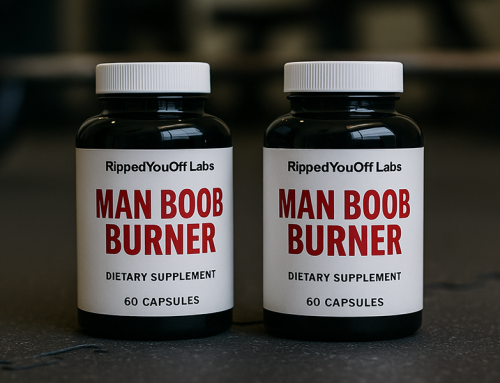For as long as I can remember, I’ve noticed those tabloid rags at the supermarket checkout line. It’s hard not to. I’m a captive audience – just standing there while the person in front of me gets slowly rung up – and right at eye level are the wildest headlines.
 But I don’t just notice them because I’m bored. I notice them because I’m a fat loss coach, and when I see outrageous health and weight loss claims, alarms go off in my head.
But I don’t just notice them because I’m bored. I notice them because I’m a fat loss coach, and when I see outrageous health and weight loss claims, alarms go off in my head.
One of the recent classics:
“LOSE 41 LBS BY MEMORIAL DAY WITHOUT DIETING!”
Now, if that were a January 1st headline, it would be a stretch, but possible. However, this was May 1st. Let’s do the math… that’s about 10 pounds a week. Sure, sounds legit. Mkay.
Then a week later, another gem from a women’s tabloid:
“BURN BELLY FAT 600% FASTER”
Wow! 600%! And not just any fat. Belly fat. Looks like someone finally cracked the code on spot reduction. (Yes that was sarcasm.)
The subhead made it even better:
“New high-protein cabbage soup diet melts pounds like magic!”
Apparently, regular cabbage soup is old news. Now it needs to be high-protein cabbage soup… and magic, too.
Here’s a tip: Whenever you see numbers like that, run. As the old saying goes: “There are lies, damned lies, and statistics.” (There’s also a book called How to Lie With Statistics, which I’m pretty sure is required reading in weight loss advertising school.)
And believe it or not, those two were tame. Some of the stuff I found while researching for this post was so far out there, even the most gullible person would raise an eyebrow.
Check these out – actual archived headlines:
Water cure for over-50 fat: Drop 16 lbs in 3 days!
TikTok doc’s thyroid cure: Drop 37 pounds this month!
#1 flat belly vitamin… study: shrink your middle 9.7X faster!
Do this for 14.6 minutes to quadruple fat burn (she lost 118 lbs at 56)!
I lost 22 lbs in a month: Easy essential oil trick melts 400% more fat… without dieting!
I lost 15 lbs in 14 days… try the liver detox that unlocks fat burning in women over 50!
I could go on for pages with these
On one hand, I laugh. Because I can laugh. I know it’s nonsense. I can see straight through the formula: a “secret,” a “cure,” a weird number like 14.6 minutes, and boom – tabloid magic.
But on the other hand, it’s not funny.
Because a lot of people don’t see through it. They believe this stuff. And when you’re exposed to it often enough, it starts to shift your sense of what “normal” looks like.
It’s the same kind of damage that came from watching The Biggest Loser. People who saw that show thought 10 pounds a week was normal. In reality, 1–2 pounds per week is what most healthy, sustainable fat loss looks like.
If you’re very overweight, losing 1% of your body weight per week is a good goal. If you’re a petite woman trying to drop the last 10 pounds, even half a pound a week is a win.
But when you’ve been flooded with stories of people “melting 22 pounds in 30 days” with essential oils and soup, losing 1–2 pounds feels… slow.
It’s not. It only feels slow because you’re comparing it to fantasy. And those expectations can derail progress fast.
So while these headlines might make me chuckle, they’re not harmless. And that brings us to the real question:
How Do They Get Away With It?
After seeing these kinds of tabloid cover claims for years, I started asking the same question you probably are:
How is this even legal? It sure doesn’t seem ethical.
We’re talking about headlines like:
“Lose 16 pounds in 3 days”
“Drop 37 pounds this month”
“Lose 41 pounds by Memorial Day, without dieting!”
These claims are printed in giant block letters front and center on the cover and right at eye level in the checkout aisle.
And yet somehow they get away with it.
Here’s the thing: If a supplement company made the exact same claims on a product label or website, they’d get slapped by the Federal Trade Commission (FTC) faster than you can say “miracle detox.”
The FTC is the government agency that protects consumers from false, misleading, or deceptive advertising. They issue fines, file lawsuits, and even help refund people who got scammed.
They’ve published what they call “Gut Check” guidelines, which is basically a list of red flags to help spot bogus weight loss ads.
That includes claims that say you can lose weight without diet or exercise or promises of losing more than 1–2 pounds per week over time
So again, how are tabloids able to run claims like the ones above on their cover week after week, year after year?
I had a hunch it came down to freedom of the press. If they’re presenting it as an editorial “story” rather than an advertisement, maybe they’re protected. So I did some digging on the FTC website and in legal archives.
Turns out I was right. But there’s even more to it than just free speech.
Freedom Of Speech And Press Versus Commercial Speech
Tabloids actually have some protection under the First Amendment. That’s where things get tricky.
The government can regulate ads and product claims a lot more strictly than it can regulate what gets published in magazines or newspapers, especially when it’s framed as editorial content rather than advertising.
That distinction changes everything.
Tabloids aren’t necessarily selling a pill, a powder, or a potion. They’re selling a story. They’re selling information. And that legal technicality gives them far more freedom than a supplement company making the same exact claim in a paid ad.
When a magazine runs an article saying, “This woman lost 20 pounds in 7 days eating cabbage soup,” it’s treated as editorial content – protected under freedom of the press.
But if a weight loss product made that same claim in an ad – “Buy this pill and lose 20 pounds of fat in a week!” – that’s commercial speech. And commercial speech is a whole different ballgame.
According to the Legal Information Institute at Cornell Law School, commercial speech is defined as any form of speech that “proposes a commercial transaction.” In plain English: if you’re trying to sell something, your words can be held to stricter legal standards.
Unlike political speech or artistic expression, commercial speech is not given full First Amendment protection. And if your claims are false, misleading, or unsubstantiated? That’s when the FTC shows up with a cease and desist – or a lawsuit.
So let’s be clear: if a supplement label says, “Melts 20 pounds of fat in 7 days,” that’s illegal. Because no one can lose 20 pounds of fat in a week. Not without cutting off a limb.
But a tabloid? They’re not saying you will lose 20 pounds. They’re saying somebody did. Allegedly. In a story.
“We’re not selling a product – we’re just reporting a miracle.”
That’s how they slide right through the loophole.
Sometimes they even weasel around the language by saying “pounds of weight” instead of “pounds of fat.” Sure, you might lose 20 pounds of water and glycogen on a crash diet… but that’s not fat loss – and they know it.
There’s another loophole these tabloids love to exploit, and it’s a sneaky one.
The Entertainment Loophole
Many of them don’t officially claim to be medical or health publications. They don’t even pretend to be accurate news sources. Instead, they position themselves as entertainment, whether they say so or not.
If questioned, the publishers might shrug and say,
“C’mon, readers know this is just for fun. We’re not giving medical advice.”
But of course, they don’t disclose that up front. And to the average consumer, especially when health claims are presented like news stories, there’s often no clear line between what’s entertainment and what’s legitimate information.
Sometimes, though, it is obvious.
Take the infamous Weekly World News, for example. Here’s a sampling of actual headlines from their archives:
“Severed leg hops to hospital”
“Bat Boy sighted in NYC subway”
“Man fries eggs on his bald head”
“174-mph sneeze blows wife’s hair off”
“Rush Limbaugh meets with space aliens”
“Alien backs Arnold for Governor”
And let’s not forget the cat collection:
“Kitten found guilty of murder”
“Vampire cat captured”
“Strange breed of cats found on Mars”
Now, who in their right mind would take anything in this paper seriously? It’s satire. It’s comedy. It’s ridiculous on purpose. And honestly, it can be fun to read – if you’re in on the joke.
But what happens when this same “just entertainment” paper runs a cover story like:
“Honey and apple cider vinegar cures… arthritis, hearing loss, impotence, hair loss, heart disease, indigestion, memory loss, gas, bladder infections, sore feet, bad breath, acne, cancer.”
Whoa. Cures cancer, too? That’s gotta be illegal, right?
I mean, we’ve seen doctors lose their medical license and go to prison for pushing fake cancer cures.
But here’s the thing:
The FTC and other watchdogs let this stuff slide. Why? Because when the story is printed next to a headline like “Elvis Lives! Aliens Release King of Rock Back to Earth,” no one is expected to take it seriously.
And that’s the loophole. If the publication is absurd enough, they get a pass. It’s just entertainment.
But not all tabloids are that obviously ridiculous.
A step closer to “real” is the National Enquirer. They still deal in over-the-top sensationalism, especially celebrity gossip, but their stories often reference real events. They just crank the dial up to 11. Here are a few of their gems:
“Hillary hitman tells all”
“Rob Lowe in sex addiction clinic”
“Hollywood’s skeleton season… Angelina down to 98 lbs”
“Richard Simmons – he’s now a woman”
You get the idea. And when a paper like this runs a weight loss or health story, it still lands in that “entertainment” gray zone. So they skate by, too.
But then we get to the women’s magazines – titles like Woman’s World. And in my opinion, this is a different animal altogether.
These magazines aren’t pushing celebrity scandals or satire. They’re pitching health and weight loss stories – every single week.
And while those claims might seem laughable to anyone in the know, many readers – especially women flipping through while waiting in line – see a friendly, lifestyle publication that feels trustworthy.
That’s what makes it dangerous.
Because even if they, too, are technically skating by under the “we’re just entertainment” defense… it sure doesn’t look like satire. And it doesn’t read like fiction. It looks like advice. And that’s the problem.
Weasel Words And Fine Print
Last but not least, these publications often slip through the cracks using two classic tools of deception: vague language and microscopic disclaimers.
As I mentioned earlier, they’ll say “weight loss,” not “fat loss.” That’s not just sloppy writing – it’s strategic. Dropping 10 or even 20 pounds of weight fast is technically possible… if you’re counting water, glycogen, and muscle. But body fat? That’s a different story.
Then come the weasel words – those fuzzy, non-committal terms like “may,” “might,” or “could.” They don’t say a soup will melt belly fat, just that it could. And if it could, well, who’s to say it won’t?
And then, of course, there’s the fine print. Buried somewhere on the cover or hidden at the bottom of the article, you might find phrases like:
“Results not typical.”
“Individual results may vary.”
“controlling calories may be necessary.”
These aren’t admissions – they’re legal shields. They don’t make the headline true, but they help protect the publisher from legal trouble. Think of them as get-out-of-jail-free cards.
Because here’s how it works:
The bold headline sells the fantasy. The tiny print walks it back. Most readers never even see it. And the publishers know that.
It’s a legal game of smoke and mirrors – and the fine print is where the magic trick happens. And unfortunately, it works.
Regulators like the FTC focus on whether a claim is “materially misleading.” If a magazine can argue that it’s just reporting a story, or that its disclaimers provide plausible deniability, they’re off the hook.
But that leads to the bigger question:
Is any of this okay?
The Ethics Problem… And Can Anything Be Done?
Even if it’s technically legal, a lot of what these tabloids do is flat-out unethical, especially when the magazine is designed to look legitimate. That’s what bothers me most.
These exaggerated claims aren’t just laughable. They can do real harm. They:
- Create totally unrealistic expectations about how fast fat loss should happen
- Encourage crash diets and metabolic trainwrecks
- Make people feel like failures when they lose weight at a normal, healthy pace
- Target vulnerable readers, especially women, who already face nonstop pressure about their bodies
These publishers know exactly what they’re doing. They’re not in the business of helping people get healthy. They’re in the business of selling paper with sensational headlines. And in some cases, it’s worse than just hype. A lot of these women’s magazines promote stories featuring fringe “doctors,” sketchy gurus, and so-called “natural” or “holistic” miracle cures.
Sure, they’re not technically selling a product. It’s just a story. Just “information.” But to the average reader, it feels like a recommendation or endorsement. That’s how these gimmicks spread and quacks get rich.
Can anything be done about it?
Honestly, probably not. This stuff has been around forever, and it keeps selling. The First Amendment protections and the editorial loopholes aren’t going anywhere.
So what’s the solution?
Be an informed consumer. Don’t fall for miracle claims. Don’t compare yourself to made-up success stories. And don’t expect 10 to 20 pounds a week to melt off because of some soup, smoothie, or essential oil “secret.”
If you glance at these magazines, treat them the same way you’d treat a show like The Biggest Loser: as entertainment. Not education. Not science. Not real advice.
Better yet, ignore them completely.
And remember, every time one of these tabloids pushes a miracle cure, it chips away at the real work that good trainers, coaches, and nutrition professionals are trying to do. It sets people up for disappointment. It feeds the “I’m failing” narrative when someone loses a solid 2 pounds a week and thinks it’s not good enough.
Don’t let that happen to you.
Next time you see one promising to “torch 10 pounds of belly fat overnight with one weird soup,” just smile, shake your head, and move along. And carry that healthy skepticism with you, whether it’s in the grocery line, on Instagram, in a supplement ad, or even in a so-called “trusted” magazine.
Tom Venuto
Author of Flexible Meal Planning For Fat Loss
PS. For a sustainable, evidence-based approach to fat loss – without gimmicks like cabbage soup, detox, water fasting or crazy claims like 600% belly fat loss, check out my newest book in the Burn the Fat Series: Flexible Meal Planning for Fat Loss






Leave A Comment